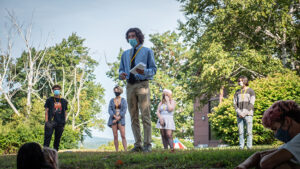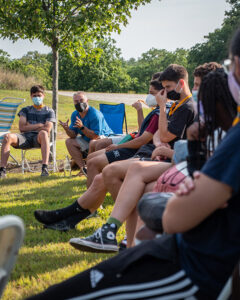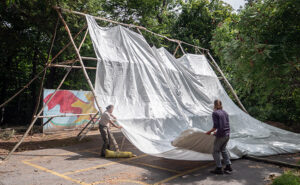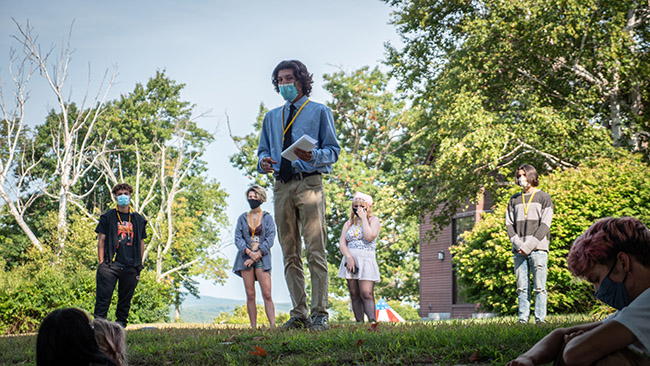
Nestled in the sequestered hills of Wilton, New Hampshire, The High Mowing Boarding School is a place founded on community, diversity, love, and individualism. Based on the principles of Waldorf education by the german philosopher Rudolf Steiner, the school offers a plethora of courses that are tightly knit with traditions upheld since the schools founding in 1942. In March, every practice that made High Mowing so attractive to students and parents was put in question.
With a campus encompassing 300 acres of woods, beautiful landscaping, and hiking trails, the school’s leadership was at a crossroads trying to decide how to reopen during a pandemic while keeping the school spirit alive, and ensuring the safety of a population of over 200 staff, faculty, and students.

“HMS faculty discovered that they enjoy teaching outdoors – multiple opportunities to recreate the curriculum with ready access to the outdoors,” said Geraldine Kline, the head of the school. “The resilience of students is also very impressive. The habit of providing comfort at all costs turns out to be unnecessary.”
With a committee consisting of four members, the head of school, program coordinator, director of finance and campus operations, and the school nurse, an already tightly knit community had to pull together and reinvent a learning environment and restructure the curriculum in a classroom with no walls.
While well-seasoned High Mowing seniors are used to extraordinary proceedings on campus, even this new way of learning called for them to adjust upon returning to campus in late August..
“The good thing about it is that while it is still such a bizarre and new environment for teachers and students alike, there are so many different opportunities for teachers to utilize their surroundings,” said Michaela Watkins, a senior at the high school.
Approaching the new curriculum with an open mind, Watkins still recognized the drawbacks that come with a pandemic-controlled school environment. In order to stay safe, the school gave up many traditions like Sunday chapel, student-led shows, and interdisciplinary events that were impossible to be transferred to a safe environment. A significant reduction in available classes and the dread of moving to online learning in winter is a concern not only students share.
“This distance learning is a great medium for giving information, but a very poor medium for actually educating students,” said Robert Sim, the freshman class teacher at High Mowing. “Education has nothing to do with transcripts and testing, but rather the development of these young people, and we really need human contact for that.”
In order to keep the in-person contact present and safe, first order of business was the division of faculty and students into cohort pods which meant the boarding population was able to freely socialize on campus, safely quarantine, and attend the usual outdoor activities. The day-student population could follow the same plan separately. Teacher groups were also assigned to different cohorts to stay with them throughout the trimester to avoid cross-contamination.
“I think it is happening in many other places, provided that the adults are creative, flexible, animated by, and faithful to the mission of their organization,” Said Kline. “HMS is very strong in this regard.”
With the cohort plan being set in place back in August, the deadline of summer ending was fast approaching with no outdoor classroom system in-place. Being natural swamp yankees, the in-house maintenance crew designed and built outdoor tents for the lower school, ordered pre-made tents for the high school, and prepared the land to safely welcome a population of 128 students back to campus. Being confined to months of quarantine in various conditions, the boarding population consisting of 61 students was also ready to return to a way of attending school they have never experienced before.
“And here they were now, back at High Mowing and they were outdoors all day. You could just see the color return back to their cheeks,” said Colleen O’Connors, a teacher and student mentor at the school.

With classrooms moving into tents, being held on fields, and not having access to the familiar chair and desk, the question of movement and portability became a key issue – a challenge that the faculty was quick to overcome.
“Before we even had this whole tent idea we were looking at what the needs of our classroom were and it just popped out of my mouth: lap desks,” said O’Connors. “Pretty soon we found ourselves in the material studio making 120 lap desks according to our own model.”
While High Mowing is dedicated to staying in a safe, in-person outdoor classroom, the move to online education is inevitable with the winter fast approaching. Every class moving back to distance learning means giving up even more traditions and the in-person touch until January. Hoping to one day not be forced to teach in a pandemic-driven classroom, High Mowing staff and faculty hope to take some of the positive lessons learned and bring them into the future; outdoor classrooms possibly being one of them.
“I think an empty classroom is like an empty sheet of paper, or a blackboard that doesn’t have anything on it yet,” said O’Connors. “I personally think it’s wonderful to have those kinds of options.”








